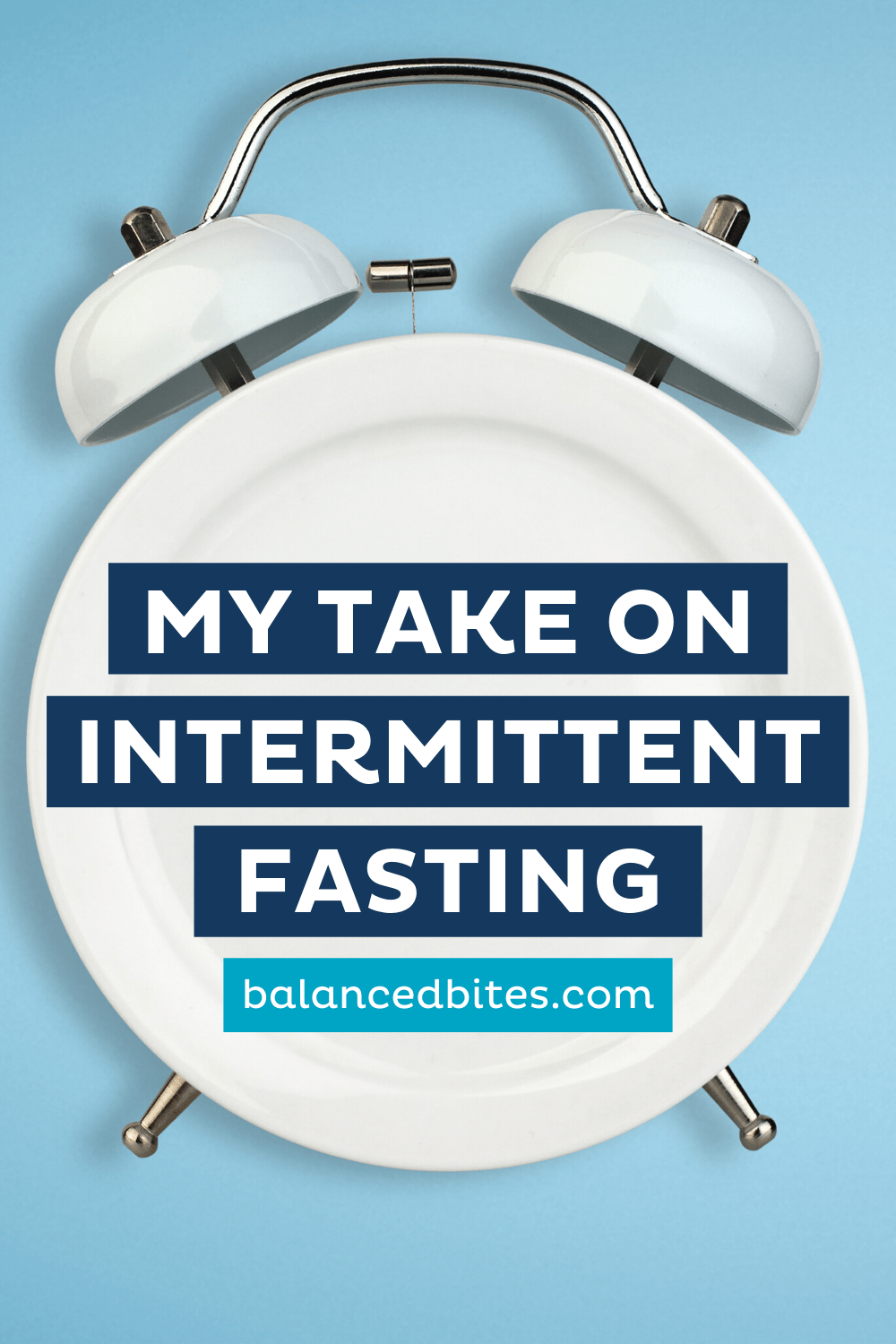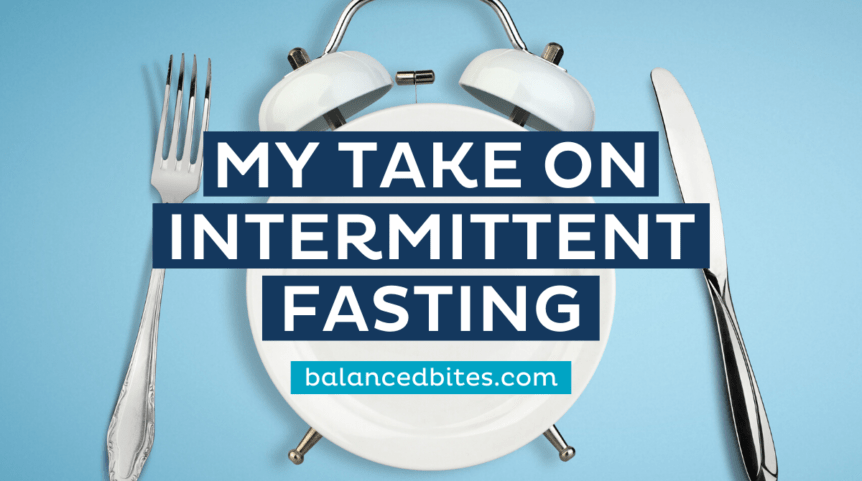 What's my take on intermittent fasting?
What's my take on intermittent fasting?
This is one of the most frequently asked questions I get!
There has been a lot of hype around intermittent fasting (IF) over the last several years, which understandably has left many of you wondering if it's right fit for your nutrition needs.
With an informed approach that is personalized to your own health and wellness, intermittent fasting can be a highly beneficial way to regulate blood sugar, improve energy levels, or lose weight.
That said, it certainly isn't right for everyone!
What is intermittent fasting?
In the simplest of terms, fasting is going for a period of time without eating. In terms of nutritional benefits, most refer to fasting as a period of time that is at least around 8 hours, and more likely 13 to 16 or more hours between eating.
You’re in a fasted state when you haven’t eaten food for around eight hours or more. When you wake up each morning, provided that you slept for around eight hours or it’s been at least that long since your last meal, you wake up fasted.
The term breakfast refers to exactly that: breaking the fast.
Intermittent fasting, as a practice, is simply intentional periods of time when you go without eating.
A common approach to daily IF would look like this:
- enjoy your last meal for the day around 6pm
- do not begin eating the next day until around 10am
The timeframe for this 16-hour fasting and 8-hour feeding window can shift to your needs.
For example may also look like:
- enjoy your last meal for the day around 8pm
- do not begin eating the next day until around Noon
Who should try intermittent fasting?
If you're new to eating healthy or the world of paleo or keto, I don’t want you fasting. Period. Figure out the food first, then you can consider adding in intermittent fasting.
I talk about keto as a hermetic stressor. It is a stressor to the body, but it has positive benefits, the same way exercise does. Adding intermittent fasting to the mix is not going to work favorably for you if you're piling on all of these new stressors at once.
If you have a health condition or are pregnant or breastfeeding, talk to your doctor about intermittent fasting before giving it a try.
For those who are in good health and not overly stressed, intermittent fasting may be right for you.
If you take the approach of a 16-hour fast and an 8-hour feeding window, for example, keep in mind that in the 8 hours that you're eating, eat the food you're supposed to eat. In other words, don't skip nutrition during that time, because the point is not that you miss out on calories. The point is to give your body a full rest between eating for the benefits of the fast.
Who should not use IF as a tool?
I generally do not recommend that the following populations fast:
- hard-gainers – those who struggle to gain or maintain body weight
- children or the elderly
- pregnant and breastfeeding women – if you were fasting before you became pregnant and feel great maintaining that, then carry on, but I don't recommend starting it during this time
- those with a history of disordered eating or with a diagnosed eating disorder
What are the benefits of intermittent fasting?
Benefits of IF include:
- increased energy levels
- improved blood sugar regulation
- limiting the “hanger” throughout the day
- weight loss
- supporting a goal of entering a state of nutritional ketosis
If you are fasting and don't experience any of the benefits, but rather find yourself feeling stressed or excessively hungry or tired, then I would recommend not fasting any longer.
My take on intermittent fasting is that it's a great method to include in your overall health and wellness toolkit… for most people.
For some, IF is a powerful and healthy way to help get a handle on their hunger and to create boundaries around time when there's a “green light for eating” versus not. For those who struggle with too much snacking or with hunger that seems out of control, this can be helpful.
For those who tend to feel dis-regulated blood sugar throughout the day after eating an early breakfast (maybe you're always reaching for a second breakfast), IF can be a helpful tool
For others, however, IF can become a manipulation tool through which they further control and limit or restrict their food intake in unhealthy ways.
For more information on intermittent fasting, check out these blog post and podcast episodes:
- Podcast Episode #298: Fasting with Dr. Jason Fung
- Podcast Episode #309: Keto & Carbs, Fasting, Autoimmunity, & Chinese Medicine with Amanda Torres
- Podcast Episode #320: Intermittent fasting, natural hair dye, & sardines
- Podcast Episode #360: Coconuts & Kettlebells with Noelle Tarr & Stefani Ruper (on CrossFit & intermittent fasting)
- Podcast Episode #373: Fasting with Dr. Jason Fung, Retraining Neural Pathways with Dr. David Hanscom, & Female Hormones with Dr. Jolene Brighten
- Podcast Episode #389: Keto & Functional Medicine Approaches for Anxiety & Stress with Ali Miller
- Blog Post: Do I have to be in ketosis to burn body fat?
If you have more questions, please leave a comment below!


Comments 3
Found this really interesting, thanks for sharing!
Diane,
I have been using intermittent fasting as an added measure to decrease the amount of food that I’ve been eating (in the last year) and had very favorable results (weight loss.)
My question is in regards to my mom, who is 89 years old, and whom I supply all of food that she consumes. My mom has a healthy appetite and often times eats larger portions of food than she should. In terms of her weight, she is modestly at an okay weight, might be 10 pounds over weight.
My question is this – what is the easiest way for me to gently guide my mom to eat smaller portions of food and what mixture of protein, fats and carbs should be in each meal she has?
Thank you
Cathy Mac
Author
Hi Catherine-
At 89 years old, I wouldn’t tell or or guide her on anything regarding her food unless she was medically in a situation where changing her weight was required. “Extra” pounds are often nothing of concern, especially not at that age. I’d bet the extra weight is health protective at this point as most people tend to have trouble maintaining weight at that point.
Long story short- let your mom enjoy her life without any nudges about her food. She sounds like she’s doing great as it is.
Cheers,
Diane